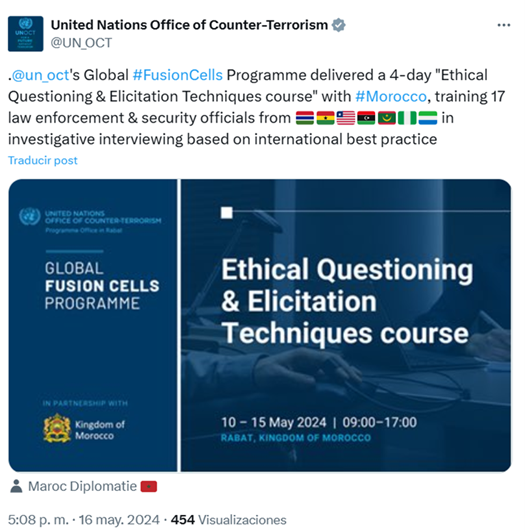Promotion of a “Fusion Centre” approach to enhance some African Member State’ capacity on interagency coordination and analysis to Prevent and Counter Terrorism
Synopsis
Objectives
This project aims to strengthen several African Member States’ capacity for interagency coordination and analysis to prevent and counter terrorism.
Components
This project is implemented under the umbrella of UNOCT's Global Fusion Cells Programme.
The project's focus is the delivery of training activities, including the tailoring of course curricula (such as presentations, study guides, and formative and summative assessments) to meet Member State requirements. This follows the use of a pre-scoping mission questionnaire designed to gather information from, and facilitate further discussions with, Member States regarding their specific needs. The project also includes the disaggregated collection of data through pre-course baseline questionnaires and post-course feedback forms, which support the development of individual course impact assessments. Additionally, the project entails the drafting of National Action Plans or Roadmaps and the development of Human Rights Due Diligence Policy (HRDDP) Risk Assessments for each beneficiary Member State’s Intelligence Agency.
Main achievements
In 2024, 285 analysts and intelligence officers from 22 Member State intelligence services and counter-terrorism centres from 22 African Member States (French-speaking, English-Arabic-speaking, Portuguese- and Spanish- speaking beneficiaries, namely Benin, Burkina Faso, Cote d'Ivoire, Democratic Republic of the Congo, Gabon, Mali, Niger, Senegal, The Gambia, Ghana, Guinea, Liberia, Libya, Mauritania, Nigeria, Sierra Leone, Angola, Cabo Verde, Equatorial Guinea, Guinea-Bissau) received training across 18 courses over 74 days in five languages. In addition, 22 National Action Plans or roadmaps and 22 Human Rights Due Diligence Policy Risk Assessments per beneficiary Member State Intelligence Agency were developed. Moreover, the UN Office of Counter Terrorism co-organized the 3rd annual High-Level Event of Heads of African Counterterrorism and Security Agencies (Marrakesh Platform) in Morocco, which enhanced coordination and joint counter-terrorism initiatives in the Sahel and in Africa, attended by over 60 Member State delegations (32 African Member States, 18 Observer States and non-governmental organizations including ACCRA Initiative, Africa Focus Group, the Global Community Engagement and Resilience Fund, and UNSMIL).
From January to June 2025, 210 law enforcement and security officials from 17 African Member States (Angola, Benin, Burkina Faso, Cabo Verde, Chad, Côte d’Ivoire, Equatorial Guinea, Gabon, The Gambia, Ghana, Guinea, Guinea-Bissau, Liberia, Mali, Niger, Nigeria, and Sierra Leone) were trained through the delivery of 13 courses in four languages (English, French, Portuguese and Spanish). In addition, in partnership with UNPOL, a three-week Training of Trainers course was delivered to 18 French-speaking participants from eight countries. Lastly, in collaboration with the Kingdom of Morocco and the Portuguese Republic, the project designed a new course on Data Analytics and Management. All training activities are firmly grounded in the protection of human rights and the integration of gender perspectives into counter-terrorism work.
Impact
Through strengthening local capacity and enabling sustainable knowledge transfer, the project provides support for capacity-building in Member States in areas such as reducing violence, combatting organized crime, ensuring responsive, inclusive, and representative decision-making, and strengthening national institutions to prevent violence and combat crime and terrorism.

Ethical Questioning & Elicitation Techniques course
